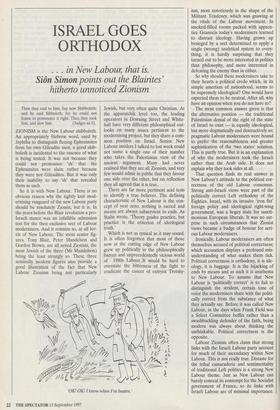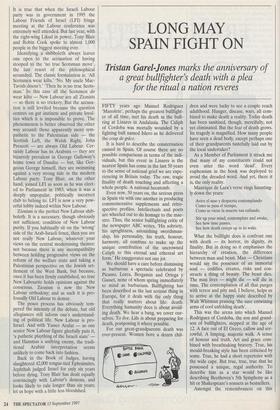ISRAEL GOES ORTHODOX
. . . in New Labour, that is.
SUM Simon points out the Blairites'
hitherto unnoticed Zionism
Then they said to him, Say now Shibboleth: and he said Sibboleth: for he could not frame to pronounce it right. Then they took
him, and slew him. (Judges xii 6).
ZIONISM is the New Labour shibboleth. An appropriately Hebrew word, used by Jephtha to distinguish fleeing Ephraimites from his own Gileadite men, a good shib- boleth is incidental to the essence of what is being tested. It was not because they could not pronounce `sh' that the Ephraimites were slain; rather because they were not Gileadites. But it was only their inability to say `sh' that revealed them as such.
So it is with New Labour. There is no obvious reason why the tightly knit mod- ernising vanguard of the new Labour party should be resolutely Zionist, but it is. In the years before the Blair revolution a pro- Israeli stance was an infallible admission test for the then exclusive sect of Labour modernisers. And it remains so, at all lev- els of New Labour. The most senior fig- ures, Tony Blair, Peter Mandelson and Gordon Brown, are all noted Zionists, the most Jewish of the three (Mr Mandelson) being the least strongly so. These three seminally modern figures also provide a good illustration of the fact that New Labour Zionism being not particularly Jewish, but very often quite Christian. At the apparatchik level too, the leading operators in Downing Street and White- hall have very different philosophical out- looks on many issues pertinent to the modernising project, but they share a com- mon position on Israel. Senior New Labour insiders I talked to last week could not name a single one of their number who takes the Palestinian view of the ancient argument. Many had never realised that they are all Zionists, and very few would admit in public that they favour one side over the other, but on reflection they all agreed that it is true.
There are far more pertinent acid tests to identify a true believer. The defining characteristic of New Labour is the con- cept of year zero: nothing is sacred and means are always subservient to ends. As Stalin wrote, 'Theory guides practice, but practice is the criterion of ideological truth.'
Which is not as cynical as it may sound. It is often forgotten that most of those now at the cutting edge of New Labour grew up politically in the philosophically barren and unprecedentedly vicious world of 1980s Labour. It would be hard to overstate the bitterness of the fight to eradicate the cancer of entryist Trotsky-
`OK! OKI I know when I'm beaten.'
ism, most notoriously in the shape of the Militant Tendency, which was gnawing at the vitals of the Labour movement. In smoked-filled rooms packed with appren- tice Gramscis today's modernisers learned to distrust ideology. Having grown up besieged by a sect determined to apply a single (wrong) analytical system to every- thing, it is hardly surprising that they turned out to be more interested in politics than philosophy, and more interested in defeating the enemy than in either.
So why should these modernisers take to their hearts a political credo which, in its simple assertion of nationhood, seems to be supremely ideological? One would have expected them to be neutral. After all, why have an opinion when you do not have to?
The most common answer given is that the alternative position — the traditional Palestinian denial of the right of the state of Israel to exist — is equally ideological, but more dogmatically and destructively so; pragmatic Labour modernisers were bound to prefer the reasonableness and greater sophistication of the 'two states' solution. This is partly true. But it is an explanation of why the modernisers took the Israeli rather than the Arab side. It does not explain why they took sides at all.
That question finds its real answer in New Labour's attitude to the political cor- rectness of the old Labour consensus. Strong anti-Israeli views were part of the politically correct Left orthodoxy of the Eighties. Israel, with its invasive 'iron fist' foreign policy and ideological right-wing government, was a bogey state for sancti- monious European liberals. It was no sur- prise in such circumstances that Zionist views became a badge of honour for seri- ous Labour modernisers.
Ironically, Labour modernisers are often themselves accused of political correctness; which accusation displays a profound mis- understanding of what makes them tick. Political correctness is orthodoxy, it is ide- ology, it is baggage. It is the hijacking of ends by means and as such it is anathema to New Labour. To assume that New Labour is 'politically correct' is to fail to distinguish the strident, certain tone of voice the modernisers share with the politi- cally correct from the substance of what they actually say. Before it was called New Labour, in the days when Frank Field was a Select Committee boffin rather than a swashbuckling defender of the faith, being modern was always about thinking the unthinkable. Political correctness is the opposite.
Labour Zionists often claim that strong links with the Israeli Labour party account for much of their ascendancy within New Labour. This is not really true. Distaste for the tribal camaraderie and sentimentality of traditional Left politics is a strong New Labour theme. Just as New Labour can barely conceal its contempt for the Socialist government of France, so its links with Israeli Labour are of minimal importance. It is true that when the Israeli Labour party was in government in 1995 the Labour Friends of Israel (LFI) fringe meeting at the Labour conference was extremely well attended. But last year, with the right-wing Likud in power, Tony Blair and Robin Cook spoke to almost 1,000 people in the biggest meeting ever.
Identifying a shibboleth always leaves one open to the accusation of having stooped to the 'no true Scotsman move', the last resort of the philosophical scoundrel. The classic formulation is: 'All Scotsmen wear kilts."No. My uncle Mac- Tavish doesn't.' Then he is no true Scots- man.' In this case all the Scotsmen do wear kilts — New Labour are all Zionists — so there is no trickery. But the accusa- tion is still levelled because the question centres on gut instincts and private loyal- ties which it is impossible to prove. The phenomenon is better observed the other way around: those apparently more sym- pathetic to the Palestinian side — the Scottish Left, the Welsh Right, John Prescott — are always Old Labour. Cer- tainly Labour has its Arabists — they are bizarrely prevalent in George Galloway's home town of Dundee — but, like Gor- geous George himself, they are swimming against a very strong tide in the modern Labour party. Tony Blair, on the other hand, joined LFI as soon as he was elect- ed to Parliament in 1983, when it was a deeply unpopular, politically incorrect club to belong to. LFI is now a very pow- erful lobby indeed within New Labour.
Zionism is the perfect New Labour shib- boleth. It is a necessary, though obviously not sufficient, condition of New Labour purity. If you habitually sit on the 'wrong' side of the Arab-Israeli fence, then you are not really New Labour, whatever your views on the central modernising themes: not because there is any incompatibility between holding progressive views on the reform of the welfare state and taking a Palestinian perspective on the Jewish set- tlement of the West Bank, but because, once it has been firmly established, no true New Labourite holds opinions against the consensus. Zionism is now the New Labour orthodoxy; and as such it is pro- foundly Old Labour to demur.
The peace process has obviously tem- pered the intensity of the debate, but old allegiances still inform one's understand- ing of political life. New Labour is pro- Israel. And with Yasser Arafat — as one senior New Labour figure gleefully puts it, `a pathetic plaything of the Israeli state' and Hammas a unifying enemy, the tradi- tional Arabist interpretation seems unlikely to come back into fashion.
Back in the Book of Judges, having slaughtered 42,000 tongue-tied Ephraimites, Jephthah judged Israel for only six years before dying. Tony Blair has dealt equally convincingly with Labour's demons, and looks likely to rule longer than six years; let us hope with a little less bloodshed.



































































 Previous page
Previous page